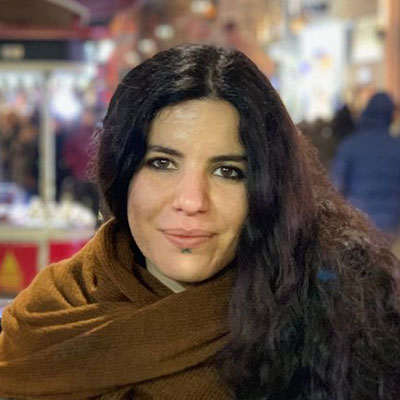Türkçe | Français | English | Castellano
At the break of dawn, Mother Sisê pulls her plastic slippers from under the bed. Outside, it’s raining cats and dogs, the sky is leaden. She stumbles down the stairs, holding on to the wall with her white and shaking hands.
Quickly Evin, that day’s guard, pulls her chair up to the window. Like a regular customer in a restaurant, always in the same seat at the same window, Mother Sisê slowly savors the falling raindrops. She has plenty of time to do that.
Plaited white hair, amber necklace, flowery dress, knitted socks, blue scarf and, most importantly, her dignified look spelling Sisê, she remains upright at the window, despite her old and tired body. Mother Sisê is silent during the day and stays motionless. Yet, she calls over Astera, wounded in combat in Rojava, of whom she takes care,“come eat something”, and sometimes takes Dersim on her knees who swirls around her like a moth. “xizir xizir Dersim guneka” (meaning: God is a waste for Dersim). Perhaps that is the best answer one can give to the imprisonment of a two-year old child with her mother. Dersim is guneka, but Mother Sisê is dignified.
Despite her heavy illnesses, her advanced age, I have not heard a single complaint out of her. She becomes angry at those who get demoralized and lose their motivation: “I took the news of the death as martyrs of my two sons and didn’t complain. I kept on with life. Letting things get us down doesn’t suit us”, she says every time. If you ask what moves her, you must know we are in Tarsus, you see, a place where each right is obtained at a cost and at risk of torture. Every week, the door opens and they take a friend to the isolation cell. We accompany her with applause and slogans. And the departing friend leaves us with a smile on her face and to the sound of youyous. That is when a small tear slides from Mother Sisê’s eyes on to her cottony cheek.
From morning until late at night, sitting on her chair, she observes the promenade from her iron-gated window. Mute, and yet, strangely, she is there every moment of our life. Every time I walk past her, I see and learn the truth from her eyes filled with blue lightning, and am struck by it. Truly, she expresses everything through her eyes.
Since my arrival, I wanted to draw a portrait describing her.
I asked myself how best to portray Mother Sisê and couldn’t find the answer. Finally, today, I sat in front of her and decided to follow my impulse of the moment.
I had read in the newspaper the article by Fatma Koçak and Bekir Avcı on Malva (Kurdish artist). They wrote that “in Malva’s works there is nothing regarding the cry, suffering or anger, and yet, we can feel them.” At that moment, I told myself yes, Mother Sisê is like a work by Malva. If Malva could see Mother Sisê, I’m sure he would be horrified nonetheless.
In truth, Mother Sisê does not need to speak in order to be understood. Beyond her smile, you will find nothing on her face that registers suffering. And yet, when you look at her, you feel to the marrow of your bones all that she has lived through, the cry that summarizes all the sufferings of the Kurds.
If you ask me how she manages that with the wavering smile on her face, perhaps we will never find out.
She is a portrait that pulls apart all the usual expressions. You watch a film, the actor expresses suffering, playing a conventional role. The expression of happiness is a blissful face. Getting to know someone calls for a bit of communication, this is a well known fact. To all that, Mother Sisê says “fiddlesticks!”
This is why I say that Mother Sisê’s resistance is a figure.
At last, I finish her portrait and show it to her. A lively smile blooms on her face. Tears come to her eyes. “hak rora razi bo” [that justice be done for you] she tells me, kissing me on the forehead.
We hung her portrait on the wall. Little Dersim, skips before it, blowing kisses and crying “neno, neno!” [grandma, grandma!]
Zehra Doğan
December 2 2018, Tarsus Prison







